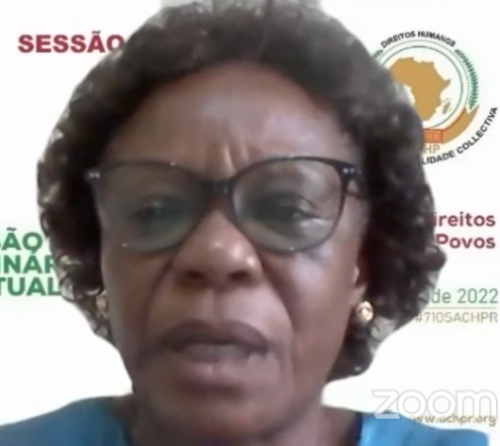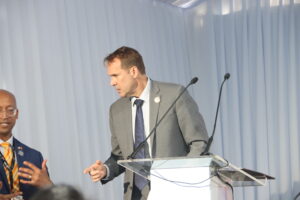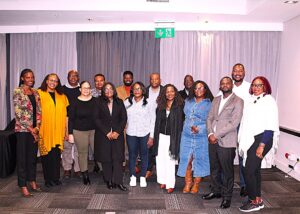Moses Magadza in Johannesburg, South Africa
A joint sitting of five standing committees of the SADC Parliamentary Forum began in Johannesburg South Africa on Thursday with the Secretary General of the SADC PF, Ms. Boemo Sekgoma, calling for enhanced parliamentary prison oversight across the Southern African region.
The Joint Session follows separate standing committee meetings that took place on Wednesday and is deliberating on a proposed Model Law on Prison Oversight to be developed by the SADC PF with the financial support of Sweden.
Addressing delegates at the opening of the two-day session, Ms. Sekgoma stated that the state of prison systems reflects the health of democracy and the extent to which nations uphold human rights and justice.
“The state of a society’s prison reflects directly on the individuals in society and the extent to which they subscribe to the notion of justice,” she said.

the SADC Parliamentary Forum in Johannesburg South Africa on Thursday. Photo: Phando Jikelo, Parliament
of South Africa
The session brings together Members of Parliament and technical experts to shape a framework for the region’s first Model Law dedicated to prison oversight. It builds on years of engagement by SADC PF with issues affecting incarcerated populations under initiatives like the Swedish-funded SRHR, HIV and AIDS Governance project.
“This Joint Session is not only about drafting legal provisions,” Ms Sekgoma said via zoom, “but also about rethinking how our societies perceive and manage incarceration. It is about ensuring that prisons are rehabilitative, not repressive.”
She said that overcrowding, inhumane conditions, poor healthcare, and systemic discrimination are rife in many prisons across the region, and warned that such conditions fuel the spread of communicable diseases like HIV, TB, and malaria, as well as organised crime.
Citing Nelson Mandela’s famous words, she reminded delegates, “A nation should not be judged by how it treats its highest citizens, but its lowest ones.”
She said these words resonate deeply in the context of prison reform and underscore the critical role of Parliament in holding the Executive accountable for prison conditions.
“The Forum has identified prison oversight as a priority because current incarceration practices in the region result in a loss of human dignity and justice, even before a person has been tried. This is inconsistent with the spirit of constitutional democracy,” she said.
Ms Sekgoma said the Model Law, once developed and adopted, will serve as a benchmark for member states to reform national laws and align with international standards, such as the UN’s Nelson Mandela Rules on the treatment of prisoners.
“The Model Law will facilitate domestication of legal norms to improve prison conditions and institutionalize oversight through mechanisms like a dedicated parliamentary committee, independent complaints systems, and the establishment of a Commissioner of Prisons,” she explained.
She called on parliamentarians to engage actively with technical experts participating in the session and praised their willingness to share their expertise. She also expressed appreciation to the Government of Sweden for funding the session through the SRHR Project (2023–2026), and acknowledged other partners and facilitators supporting the Forum’s work.
She urged MPs to approach the session with openness and purpose.
“Prison oversight is a cardinal theme which can significantly improve the state of democracy in the SADC region,” she said. “Let us consider this theme with an open mind as we address the outline of the Model Law.”

Hon. Teresa Manuela. Photo: Contributed.
Speaking to delegates also via zoom, the Special Rapporteur on Prisons, Conditions in Detention and Policing in Africa, Hon. Teresa Manuela, made a call for regional parliamentary action to transform prison oversight and safeguard the rights and dignity of detainees across Southern Africa.
Speaking under the sub-theme, “The Importance of Independent Monitoring of Places of Detention and the Importance of Parliamentary Scrutiny of Detention Conditions,” Hon. Manuela stressed that the time for rhetoric had passed and that “surveillance of places of detention must become an instrument for change.”
Drawing on decades of research and legal instruments developed since the landmark 1996 Kampala Declaration, the Special Rapporteur reminded delegates of the unfinished business in prison reform.
“An overview of what is happening in prisons in Africa allows us to see that the work has yet to be completed,” she said.
She cited key regional human rights instruments, including the Luanda Guidelines and the Principles on the Decriminalisation of Petty Offences in Africa, and noted their provisions that call for transparency, independent inspections, and the establishment of national institutions such as human rights commissions and parliamentary committees to examine detention facilities.
More from Africa News 24
SADC PF Committee proposes bold recommendations on prison oversight
Hon. Manuela expressed concern over the fact that few SADC Member States have ratified the Optional Protocol to the Convention Against Torture (OPCAT), which obliges the establishment of National Preventive Mechanisms. However, she praised South Africa, Mauritius, and Mozambique as regional models for advancing detention oversight.
“The power to create or eliminate criminal offences lies exclusively with parliaments,” she stressed. She said that overcrowding is often worsened by incarceration for petty offences that should be addressed through social rather than criminal interventions.
She urged lawmakers to seize their legislative and budgetary roles to, inter alia, decriminalise petty offences, enhance parliamentary inspections of detention centres, demand accountability for abuse, and allocate sufficient funding to improve prison conditions.
She challenged the SADC PF to develop a SADC Model Law on Prison Oversight that promotes collaboration among oversight bodies, ensures data sharing and report consolidation, and establishes mechanisms for follow-up and enforcement of recommendations.
“What we want,” she said, “is for the findings to become a problem and for some state body to provide an efficient and effective response.”
Hon. Manuela called for normative provisions that would give SADC parliamentarians legal power to demand the enforcement of prisoners’ rights and hold violators accountable.
The meeting ends on Friday.
-Moses Magadza is the Media and Communications Manager at the SADC Parliamentary Forum.












